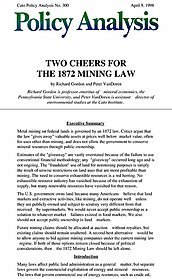Metal mining on federal lands is governed by an 1872 law. Critics argue that the law “gives away” valuable assets at prices well below market value, often for uses other than mining, and does not allow the government to conserve mineral resources through public ownership.
Estimates of the “giveaway” are vastly overstated because of the failure to use conventional financial methodology; any “giveaway” occurred long ago and is not ongoing. The “fraudulent” use of land for nonmining purposes is simply the result of unwise restrictions on land uses that are more profitable than mining. The need to conserve exhaustible resources is a red herring. No exhaustible resource industry has vanished because of the exhaustion of supply, but many renewable resources have vanished for that reason.
The U.S. government owns land because many Americans believe that land markets and extractive activities, like mining, do not operate well unless they are publicly owned and subject to scrutiny very different from that received by supermarkets. We would never accept public ownership as a solution to whatever market failures existed in food markets. We also should not accept public ownership in land markets.
Future mining claims should be allocated at auction without royalties, but existing claims should remain unaltered. A second-best alternative would be to allow anyone to bid against mining companies under the current mining law regime. If both of those options remain closed because of political considerations, then the 1872 Mining Law should be left alone.

This work is licensed under a Creative Commons Attribution-NonCommercial-ShareAlike 4.0 International License.


